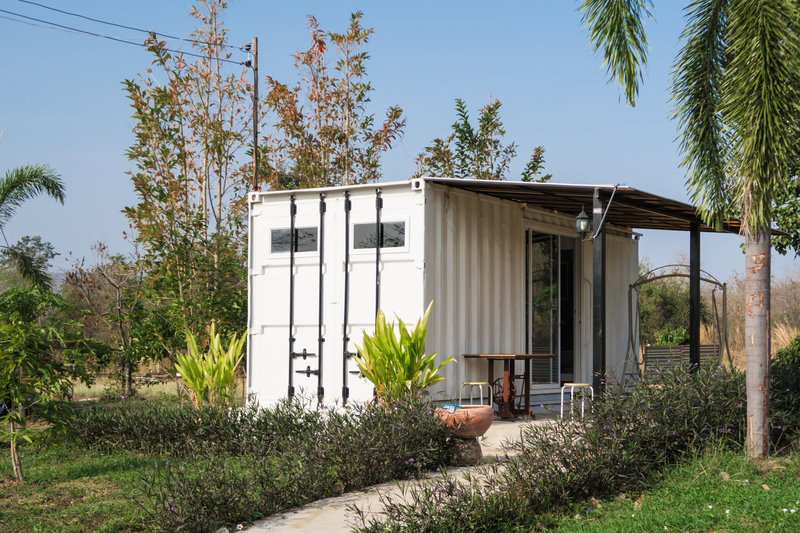Sustainable Spaces in the City: How Recycled Houses are Redefining Urban Living
Posted on 30/04/2024
In today's world, sustainability has become a top priority as we face the devastating effects of climate change. As more people migrate towards urban areas, cities are facing the challenge of accommodating a growing population without compromising on environmental conservation. This has led to the rise of recycled houses, which are revolutionizing urban living by providing sustainable and eco-friendly living spaces. In this article, we will delve into the concept of recycled houses and how they are redefining urban living.
What are Recycled Houses?
Recycled houses are homes that have been constructed using recycled or repurposed materials. These materials can range from reclaimed wood to shipping containers, plastic bottles, and even tires. Instead of ending up in landfills, these materials are given a new lease of life by being incorporated into the construction of modern, livable homes.
One example of a popular recycled housing project is "The Reversible Destiny Lofts" in Mitaka, Tokyo designed by Shusaku Arakawa and Madeline Gins. The lofts are made entirely out of reused building materials such as bricks and steel pipes. They also feature green roofs and windows that provide natural ventilation, reducing the need for energy-consuming air conditioning units.

Advantages of Recycled Houses
Recycled houses offer numerous benefits to both individuals and communities. Let's take a closer look at some of their advantages:
1) Environmental Benefits: The most significant advantage of recycled houses is their positive impact on the environment. By using recycled materials, these homes reduce waste and conserve natural resources. It also reduces the carbon footprint associated with traditional home construction methods.
2) Affordable Housing: In many cities around the world, finding affordable housing is becoming increasingly challenging. Recycled houses provide an alternative solution as they are often cheaper to build compared to traditional homes. This makes them an attractive option for low-income families or individuals looking to own a home.
3) Versatile Design: Recycled houses' unique construction materials offer a wide range of design possibilities. From sleek and modern shipping container homes to cozy cabins made from reclaimed wood, the only limit is one's imagination. These homes can also be easily customized and expanded, making them a flexible option for growing families.
4) Energy Efficient: Many recycled houses are designed with energy efficiency in mind. For example, homes made from shipping containers have excellent insulation, reducing the need for artificial heating and cooling. This translates to lower utility bills for homeowners.
Challenges of Recycled Houses
While recycled houses offer numerous advantages, there are also some challenges that need to be addressed:
1) Lack of Regulations: Building codes and regulations often do not address or consider the use of non-traditional building materials. This creates challenges for those looking to construct recycled houses as they may face resistance or even legal issues.
2) Limited Availability: The availability of recycled materials may vary depending on the location, making it challenging to source all the required materials for construction. This can increase costs and prolong the building process.
3) Maintenance: Some recycled materials may require more maintenance than traditional building materials, especially in extreme weather conditions. For instance, homes made from shipping containers may require rust prevention treatments to ensure their longevity.

Tips for Building a Recycled House
If you are considering building a recycled house, here are some tips to keep in mind:
1) Do Your Research: Before embarking on this project, thoroughly research the building codes and regulations in your area. Seek professional guidance if needed to ensure you comply with all requirements.
2) Source Materials Wisely: Be creative when sourcing materials for your home. Look out for local suppliers with good quality recycled materials at affordable prices.
3) Consider Structural Integrity: It's essential to check the structural integrity of any recycled materials you plan to use, especially for load-bearing elements. Safety should always be a priority in any construction project.
Takeaways
Recycled houses are an excellent way to promote sustainability and provide affordable housing in urban areas. While there are challenges involved, they offer numerous advantages that make them an attractive option for those looking to live in eco-friendly homes.
In conclusion, recycled houses are redefining urban living by providing sustainable and versatile living spaces. With proper planning and consideration for potential challenges, these homes can offer an affordable and eco-friendly alternative to traditional homes. Let's continue to embrace this trend and promote a more sustainable future for our cities.
Latest Posts
Eco-Friendly Home Organization
Dispose with Care: Responsible Strategies for Removing Waste
Sustainable Solutions for Commercial Waste
Sustainable Solutions: A Closer Look at London's Waste Reduction Efforts

 020 3744 5712
020 3744 5712










